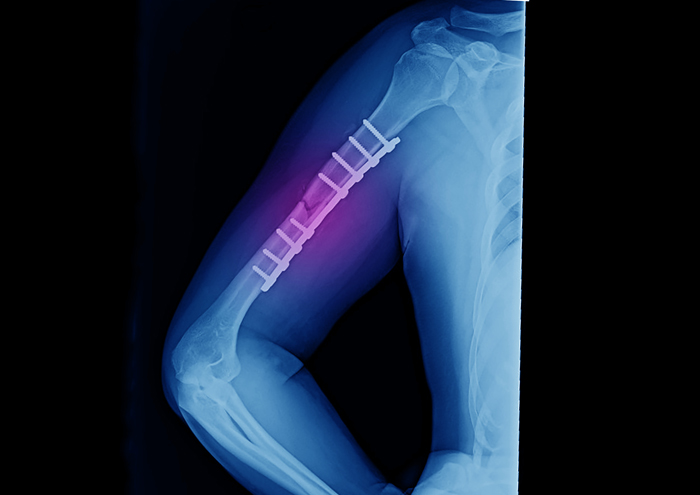Open Reduction Internal Fixation Surgery Treatment & Diagnostics in Sadashiv Peth, Pune
Open Reduction Internal Fixation Surgery
Open reduction internal fixation (ORIF) is a procedure for repairing severely fractured bones. Only significant fractures that cannot be treated with a splint or cast are treated using this procedure. The most common types of such injuries include displaced unstable or joint-related fractures.
What is Open Reduction Internal Fixation Surgery?
ORIF is a surgical procedure wherein severe fractures are treated by first making an incision for bone realignment and holding them together using hardware such as screws, plates, rods, or pins.

Why is Open Reduction Internal Fixation Done at Apollo Spectra, Pune?
ORIF surgery is done when the bone has moved out of position, has broken in multiple places, or is sticking out through the skin. It may also be performed if a closed reduction surgery was previously performed but the bone didn’t heal correctly. With this procedure, pain can be reduced and mobility is restored with correct healing of the bone.
How is Open Reduction Internal Fixation Surgery Done in Pune?
First, the patient is administered general anesthesia. Hence, the patient will be asleep during the surgery and not feel any pain. Then, the surgeon will proceed with open reduction. In this part, the surgeon will make an incision and realign the broken bone.
After this, internal fixation is done wherein hardware such as metal plates, rods, pins, or screws, depending on the type and location of the fracture, will be attached to the bone to hold it together in a proper position. After this, the incision is closed surgically, using staples or stitches. The surgeon will apply a bandage on the incision. If need be, the limb may be put in a splint or cast.
Request an appointment at Apollo Spectra, Pune
Call 1860-500-2244 to book an appointment
What Happens After Open Reduction Internal Fixation Surgery?
After ORIF surgery, the patient is kept under observation for a few hours. Their blood pressure, pulse, and breathing are monitored. Nerves near the site of injury will also be checked for damage if any. Patients may be discharged on the same day or have to stay in the hospital for a few days, depending on their injury. Generally, patients with an arm fracture are able to go home on the same day, whereas those with leg fractures need to stay longer.
What are the Complications Associated with Open Reduction Internal Fixation Surgery?
Some of the risks and complications associated with ORIF surgery include -
- Infection at the incision site or due to hardware
- Blood clot
- Damage to blood vessels or nerves
- Abnormal or incomplete bone healing
- Low mobility or none
- Arthritis
- Popping or snapping sounds
- Compartment syndrome
- Bleeding
- Anesthesia allergy
- Ligament or tendon damage
- Hardware dislocation
- Muscle damage
- Tendonitis
- Chronic pain
Conclusion
ORIF surgery is only required for serious fractures. Most patients recover within 3 to 12 months after ORIF surgery and can get back to their daily activities. Physical therapy, pain medication, and rest are needed after the surgery for quicker and smooth recovery.
Most patients recover within 3 months to 1 year after ORIF surgery. Recovery time varies with each patient and the type, location, and severity of the fracture. It may take longer to recover if any complications arise after the surgery.
For quick recovery after ORIF surgery, these steps should be taken -
- Keeping the limb elevated - After ORIF surgery, your doctor might advise you to keep your arm or leg elevated to avoid swelling. You may also apply an ice pack to the area.
- Physical therapy - You may have to perform certain exercises as part of physical therapy after ORIF surgery, to regain mobility and function in the repaired limb.
- Pain medication - Your doctor may prescribe certain medications that you may take for managing pain after ORIF surgery, according to your doctor’s instructions.
- Avoid applying pressure - You may need to keep your limb immobile for a while after the surgery. Your doctor may give you crutches, a sling, or a wheelchair so that pressure isn’t applied on the limb.
- Keep the incision site clean - You need to ensure that your incision area is clean. Wash your hands regularly and keep your incision site covered. Your doctor will instruct you on how to clean the area and change your bandage.
Individuals who have a severe fracture that cannot be treated with a cast or splint may be eligible for ORIF surgery. They may also be eligible for ORIF surgery if they’ve had a closed reduction surgery in the past however, the bone didn’t heal properly. ORIF surgery is not required in cases of minor fractures.
Our Top Specialities
NOTICE BOARD
CONTACT US
CONTACT US
 Book Appointment
Book Appointment


.svg)
.svg)
.svg)
.svg)








